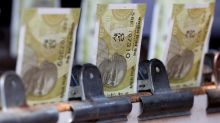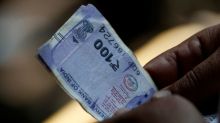Straits Times Index
3,426.47 -3.98 (-0.12%) Nikkei
37,667.41 -202.10 (-0.53%) Hang Seng
17,021.31 +16.34 (+0.10%) FTSE 100
8,285.71 +99.36 (+1.21%) Bitcoin USD
68,831.23 +1,474.91 (+2.19%) CMC Crypto 200
1,390.12 +59.51 (+4.47%)
 BusinessReuters
BusinessReutersRupee ends at record low, logs fourth consecutive weekly decline
Volatility in the Chinese yuan, outflows from local equities following a hike in capital gains taxes on equities in the budget, and tepid risk appetite hurt the rupee this week, dragging it to record lows for four out of five trading sessions. Asian currencies were mixed, with the yuan declining 0.3% while the Thai baht and Philippine peso gained.
 BusinessReuters
BusinessReutersRupee closes higher aided by yuan rally; forward premiums tick up
The Indian rupee ended mildly stronger on Thursday as a rally in the Chinese yuan and likely intervention from the Reserve Bank of India supported the local currency. The dollar index was down 0.1% at 104.2.
 BusinessReuters
BusinessReutersStocks add to recent losses; yen flat after 2 1/2-mo high vs dollar
NEW YORK (Reuters) -World stock indexes mostly fell in choppy trading Thursday, adding to losses after a tech-led selloff in the previous session, while the Japanese yen drifted near flat after reaching a 2 1/2-month high against the U.S. dollar. U.S. megacap stocks were mostly in positive territory throughout afternoon trading before losing some ground by session's end. Tesla shares were last up 2%, while shares of Nvidia were down 1.7%.